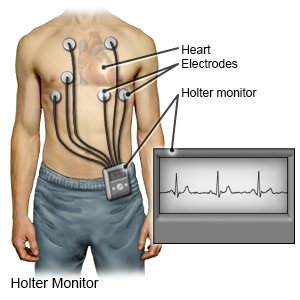Heart Palpitations
Medically reviewed by Drugs.com. Last updated on Aug 4, 2025.
What are heart palpitations?
Heart palpitations are feelings that your heart races, jumps, throbs, or flutters. You may feel extra beats, no beats for a short time, or skipped beats. You may have these feelings in your chest, throat, or neck. They may happen when you are sitting, standing, or lying. Heart palpitations may be frightening, but are usually not caused by a serious problem.
What causes heart palpitations?
- Anxiety, stress, or lack of sleep
- Exercise
- A fever or illness
- Medicines, such as diet pills, certain cold and allergy medicines, and herbal supplements such as ginseng
- Caffeine, nicotine, or illegal drugs such as cocaine
- Pregnancy
- Medical conditions, such has dehydration, thyroid disease, low blood sugar level, or anemia
How are heart palpitations diagnosed?
Your healthcare provider will examine you and ask about your symptoms. Tell the provider if you smoke, use illegal drugs, or have a family history of heart problems. Rarely, heart palpitations may be caused by a more serious condition. Examples include a heart valve problem, heart failure, or a problem with how your heart beats. You may need tests to make sure your palpitations are not caused by a more serious problem:
- Blood and urine tests measure your electrolyte, blood cell, and blood sugar levels. Your thyroid hormone levels may also be measured. If you are a woman, your blood or urine may be tested for pregnancy hormones.
- An EKG test records your heart rhythm and how fast your heart beats. It is used to check for abnormal heart beats or heart damage. You may also need to wear a Holter monitor while you do your usual activities. A Holter monitor is a portable EKG that you may wear for 24 to 48 hours.

- An echocardiogram is a type of ultrasound. Sound waves are used to show the structure and function of your heart.
- An exercise stress test helps healthcare providers see how well your heart handles stress. The test can check for blockages in your heart or abnormal heartbeats. Ask your healthcare provider for more information about a stress test.
- An electrophysiology study is a procedure to check the electrical pathways in your heart. The electrical pathways control your heartbeat.
How are heart palpitations treated?
Palpitations usually do not need treatment. Your healthcare provider may stop or change your medicines if they are causing your palpitations. Conditions that cause palpitations, such as an abnormal heartbeat, will be treated.
Treatment options
The following list of medications are related to or used in the treatment of this condition.
What can I do to help prevent heart palpitations?
- Manage stress and anxiety. Find ways to relax such as listening to music, meditating, or doing yoga. Exercise can also help decrease stress and anxiety. Talk to someone you trust about your stress or anxiety. You can also talk to a therapist.
- Get plenty of sleep every night. Ask your healthcare provider how much sleep you need each night.
- Do not drink caffeine or alcohol. Caffeine and alcohol can make your palpitations worse. Caffeine is found in soda, coffee, tea, chocolate, and drinks that increase your energy.
- Do not smoke. Nicotine and other chemicals in cigarettes and cigars may damage your heart and blood vessels. Ask your healthcare provider for information if you currently smoke and need help to quit. E-cigarettes or smokeless tobacco still contain nicotine. Talk to your healthcare provider before you use these products.
- Do not use illegal drugs. Talk to your healthcare provider if you use illegal drugs and want help to quit.
Call 911 or have someone else call for any of the following:
- You have any of the following signs of a heart attack:
- Squeezing, pressure, or pain in your chest
- You may also have any of the following:
- Discomfort or pain in your back, neck, jaw, stomach, or arm
- Shortness of breath
- Nausea or vomiting
- Lightheadedness or a sudden cold sweat
- You have any of the following signs of a stroke:
- Numbness or drooping on one side of your face
- Weakness in an arm or leg
- Confusion or difficulty speaking
- Dizziness, a severe headache, or vision loss
- You faint or lose consciousness.
When should I seek immediate care?
- Your palpitations happen more often or last longer than usual.
- You have palpitations and shortness of breath, nausea, sweating, or dizziness.
When should I contact my healthcare provider?
- You have questions or concerns about your condition or care.
Care Agreement
You have the right to help plan your care. Learn about your health condition and how it may be treated. Discuss treatment options with your healthcare providers to decide what care you want to receive. You always have the right to refuse treatment. The above information is an educational aid only. It is not intended as medical advice for individual conditions or treatments. Talk to your doctor, nurse or pharmacist before following any medical regimen to see if it is safe and effective for you.© Copyright Merative 2025 Information is for End User's use only and may not be sold, redistributed or otherwise used for commercial purposes.
Learn more about Heart Palpitations
- Atorvastatin (Lipitor): Top 12 Drug Facts You Need to Know
- Do blood pressure drugs interact with alcohol?
- Side Effects of Weight Loss Drugs
Treatment options
Medicine.com guides (external)
Further information
Always consult your healthcare provider to ensure the information displayed on this page applies to your personal circumstances.
